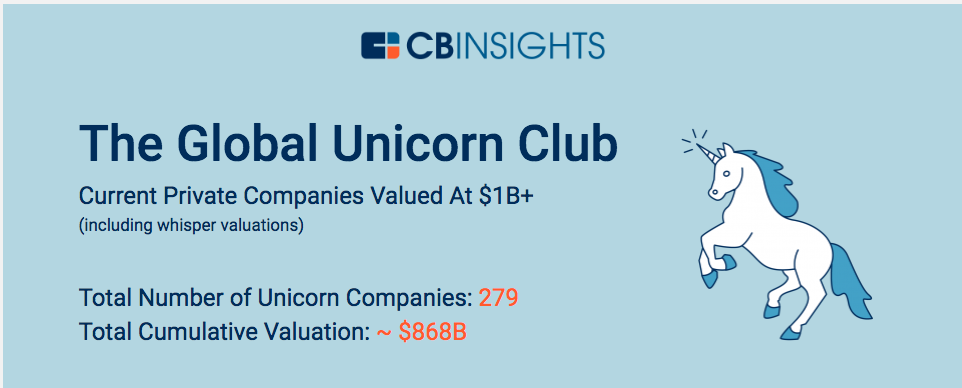New York City-based big-data research firm CB Insights released its list of the world’s Unicorns – tech startups valued at $1 billion or more – earlier this year and boy, Europe barely registered compared to the United States, China and even little Israel.
That’s not good for our audience – highly-skilled, English-speaking internationals in Europe – many of whom are looking for opportunities in the startup and tech worlds.
I’ve been meaning to get to this for a while, but that little voice inside my head kept said, “Yeah, it looks bad, but what does this REALLY mean?” Is this a crisis .. or an opportunity in disguise?
Let’s find out.
As of August, CB Insights counts more than 260 unicorns around the world. In that list, the U.S. had 47 percent of all the Unicorns, up 7 percent since their earlier list.
(By the way, everyone and their brother has a list. Because the definition of a “Unicorn” is pretty fluid, with no standard valuation methodology, those lists not only differ, but change constantly. See the vid above. But the data confirms the U.S. alone has about 50 percent of all Unicorns.)
Because it has more data, we used CB Insight’s “Global Unicorn Club” running list of all Unicorns. And speaking of data, it’s a little bit misleading, because several European companies that used to be Unicorns including Adyen and Booking.com in the Netherlands, where Dispatches Europe based, just went public or been acquired by publicly traded companies. Which, of course, is the finish line.
Even if you could count the now-public young companies, Europe didn’t cover itself in glory.
Of the 279 Unicorns, the U.S. has the most followed by China and India.
There are a lot of ways to parse this data including analyzing raw numbers and aggregate value.

Let’s start by looking at the number of Unicorns:
The U.S., with 310 million people, accounts for about 49 percent of the world’s Unicorns, or 136 of the 279, based on CB Insights data.
China, with 1.38 billion, has 69 Unicorns on the list, or about 25 percent.
So that leaves just 26 percent for the rest of the world!
Europe? With 740 million people, we have 24 Unicorns, or eight percent, IF you count the United Kingdom’s 10. If you don’t (and why would we with Brexit?), then Europe has a grand total of 14, or five percent.
Five. Percent. Nice ….
The deets:
The breakdown for Europe is interesting, with Germany No. 1 on the Continent with six. After that, seven countries – Sweden, Malta, Luxembourg, France, Switzerland, Netherlands, Estonia and Portugal – each currently account for a grand total of one Unicorn.
India has 13, just one less than Europe.
And Israel – population 8.5 million people – has four on the list, just two less than Germany (population 83 million), which has the most in Europe if you don’t count the U.K.
There are lots of ways to benchmark progress, but none favorable to Europe.
Let’s take a look at the super-Unicorns.
In CB Insights land, “decacorn” are startups with over $10 billion valuations, and a “hectocorn” is valued at over $100 billion.
And here’s the data point that tells the tale: Of the eight Unicorns on the CB Insights list valued at over 20 billion, all are in the U.S.
The most valuable is Uber at $72 billion.
Europe doesn’t have an Uber or a Palantir or a Stripe or an Airbnb or a SpaceX or a WeWork or any of the concepts that have attracted huge investments from the Benchmarks, the A16Zs or Google Ventures … and changed the world. And it’s been like this since Apple was founded in 1976. So 40-plus years of playing catch up ….
The UK’s most valuable is a decacorn, Global Switch, at about 11 billion.
You have to go way, way down the list to Germany’s Auto 1 Group and Otto Bock Healthcare – both valued at about $3.5 billion – before you get to the first true European Unicorns. Sweden’s Klarna is down the list valued at $2.5 billion along with Malta’s (yes, Malta) VistaJet.
So, now what?
On one hand, Europe clearly is lagging behind – way behind – the United States, China and even on some level, Israel.
On the other, you have to wonder if the lack of Unicorns isn’t an opportunity in a changing world.
Here’s what we mean:
First, with Brexit and Trump, neither of those ultra-nationalist experiments is going to end well, so we predict a lot of talent and capital is headed for Europe. More importantly, many of the young talents we talk with across Europe each week are suddenly reconsidering going to The Valley or Boston and are staying put.
Second, European policymakers are changing the rules including immigration policy to try to reverse this trend. This means more startup visas.
Third, China in 2018 looks like Japan circa 1985: It can do no wrong. Hong Kong, Shanghai and Shenzhen have some of the largest equity markets in the world. China is spinning out super-successful companies such as Huawei left and right. But China is essentially a Communist dictatorship dressed up in a Savile Row suit. That dictatorship has started to get a little nervous lately and suddenly is reassessing the independence of companies that were theoretically “private.”
A reversal of the trend toward capitalism that began back in the 1990s with Deng Xiaoping would instantly make Europe more attractive to investors.
But our glass-half-full evaluation aside, we see that Europe has a lot of systemic problems including:
• a culture that stresses work/life balance. Which is is nice, but not realistic if you’re talking about starting companies that change the world. We see ping-pong tables at startup offices, which is an amusing affectation adopted from The Valley. In The Valley, you have a ping-pong table because you rarely go home and need to blow off a little steam at midnight. In Europe, everyone is out the door by six.
• no Sandhill Road. There are lots of VC firms in London, but very, very few active players on the continent. (We’re doing our part, bringing investors from the U.S.)
• no hero worship. In the U.S., every biz school student, startup founder and computer geek knows all about Drew Houston, Peter Theil and the PayPal Mafia, Steve Jobs, Marc Andreessen, Zuck, Page and Brin. They know about Lean Startup and follow Gary Vaynerchuk, Guy Kawasaki and Eric Ries.
In Europe, young people still dream about pensions and long careers as senior VPs at big companies. The only celebrities are movie stars and football heroes. Ask a European to name the most successful startup player, and very few people have even heard of Daniel Ek, Sebastian Siemiatkowski or Pieter van der Does, much less their companies (Spotify, Klarna and Adyen, respectively.)
• too little foreign capital. American VCs are no longer sticking to the “if a startup is more than 20 miles away, we’re not interested” rule. Now, you see Sequoia Group investing in China and India. So why not Europe? To some extent, they are. Accel Partners is investing in French startups. Sequoia invested in Klarna. But mostly, European startups are getting money from European funds such as Rocket Internet’s in Germany and EQT Partners in Sweden.
They simply can’t deploy capital on the level of the American and Chinese VCs and private equity funds.
All this said, what a lot of observers are missing is that Europe has a “Third Way.”
The most successful tech companies in the Netherlands – ASML, NXP and Shapeways – were spun out of Philips Electronics.
Big corporations such as Philips and AkzoNobel funding their best internal teams of disrupters might ultimately prove a faster, more efficient way of creating next-gen companies.
But until they spin out a Google or an Apple, European policymakers, educators and financiers need to a take a long, hard look at where Europe is going.
Co-CEO of Dispatches Europe. A former military reporter, I'm a serial expat who has lived in France, Turkey, Germany and the Netherlands.















